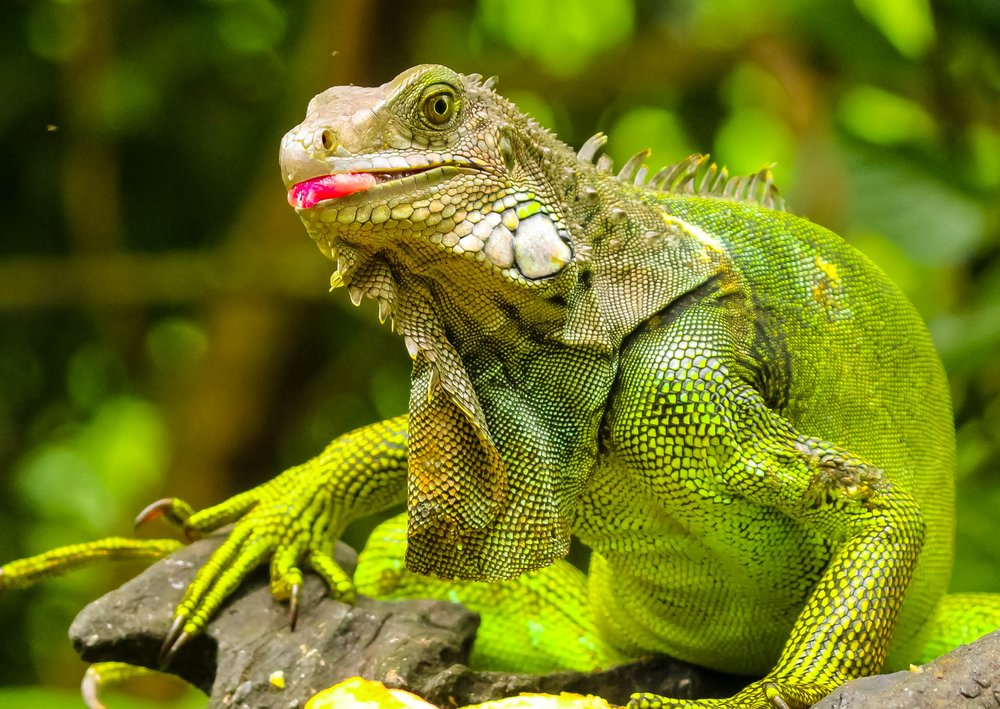The public perception of the green iguana has gone from oddity to nuisance to invasive exotic. And the Florida Wildlife Commission (FWC) is urging the public, in no uncertain terms, to kill them.
“The FWC encourages homeowners to kill green iguanas on their own property whenever possible,” the commission recently wrote on its website. “Iguanas can also be killed year-round and without a permit on 22 public lands in south Florida.”
The national news outlets — like The Washington Post and Fox News — are picking up on the story. Locals already know it.
The FWC’s new messaging is probably a reflection of what’s happened in the Cayman Islands. In October of 2018, the island government put a bounty on iguanas’ heads — $5 or $6 each. According to University of Florida’s Joseph Wasilewski the green iguana population was cut in half very quickly — from an estimated 1.6 million to 800,000.
“The iguana situation has changed in the Keys, and the attitudes of locals have also changed,” said Chuck Meier, known as Big Pine Key’s “iguana assassin.” (Look for his iguana cookbook on Amazon.com.) “A few years ago, some people were saying ‘just leave them alone.’ Well, those same people are now calling me and asking if I can come over.”
So long as the killing is done on private property with the landowner’s permission it is legal. However, it must be done humanely; i.e., no torture. Meier recommends a high-velocity pellet gun with a heavier grain pellet to pierce the animal’s tough hide.
“Shoot them in the top of the head, or right behind the eye above that little ear plate. If the iguana is facing you, hit it in the chest.”
Tom Portuallo of Iguana Control has been in the business for a decade. It’s a good business. He said he has contracts with numerous HOA’s (Home Owners Associations), townships, big commercial properties like resorts, as well as individual homeowners.
“For homeowners that aren’t squeamish, and are accustomed to hunting, it’s fine to kill them yourself. But if you’ve never picked up a ‘device,’ you will probably do a horrible job. My staff and I can euthanize iguanas in a humane way.”
“Green iguanas were first reported in Florida in the 1960s in Hialeah, Coral Gables and Key Biscayne along Miami-Dade County’s southeastern coast.”
— FWC
Iguana Control has offices and workers all over South Florida, including a storefront in Key West on Fleming Street. He has patented a line of products to repel or eradicate iguanas.
“There’s no repellent or poison that really works. The only options are a physical barrier or removal,” Portuallo said.
In fact, about the only thing that will kill an iguana is cold. They are cold-blooded reptiles. And since the Florida Keys hasn’t seen a good cold snap in, oh, forever, the weather has done nothing to diminish the population of this exotic invasive.
According to Meier, hunting iguanas isn’t a negative. They are, he said, “ a green, walking protein pouch.”
“The problem with America is that we are separated from our food sources. I grew up on a farm. I know where chicken wings come from. There were eight people in my family and we hunted not to kill, but to stack the freezer and the smokehouse,” Meier said. “Iguanas are a much more viable food source.”
By the way, he said the BBQ iguana is far and away the favorite recipe in his book, take a deep breath, “The Key West Iguana Killers Club Cookbook: The Official Sportsmans Guide to Iguana Hunting in Key West and South Florida.”
Of the BBQ recipe, he said: “Let’s just anoint it with fire and eat it. It’s the easiest recipe. And you find the wives don’t want it anywhere near their kitchen, so the guys go out and use the BBQ.”
There are a couple more rules about green iguanas to note:
- Captured iguanas cannot be relocated and released at other locations in Florida.
- If you have a green iguana as a pet, and no longer can care for it, it must be surrendered to the FWC’s Exotic Pet Amnesty Program. For more information, visit myfwc.com or call 888-Ive-Got1(483-4681).

























